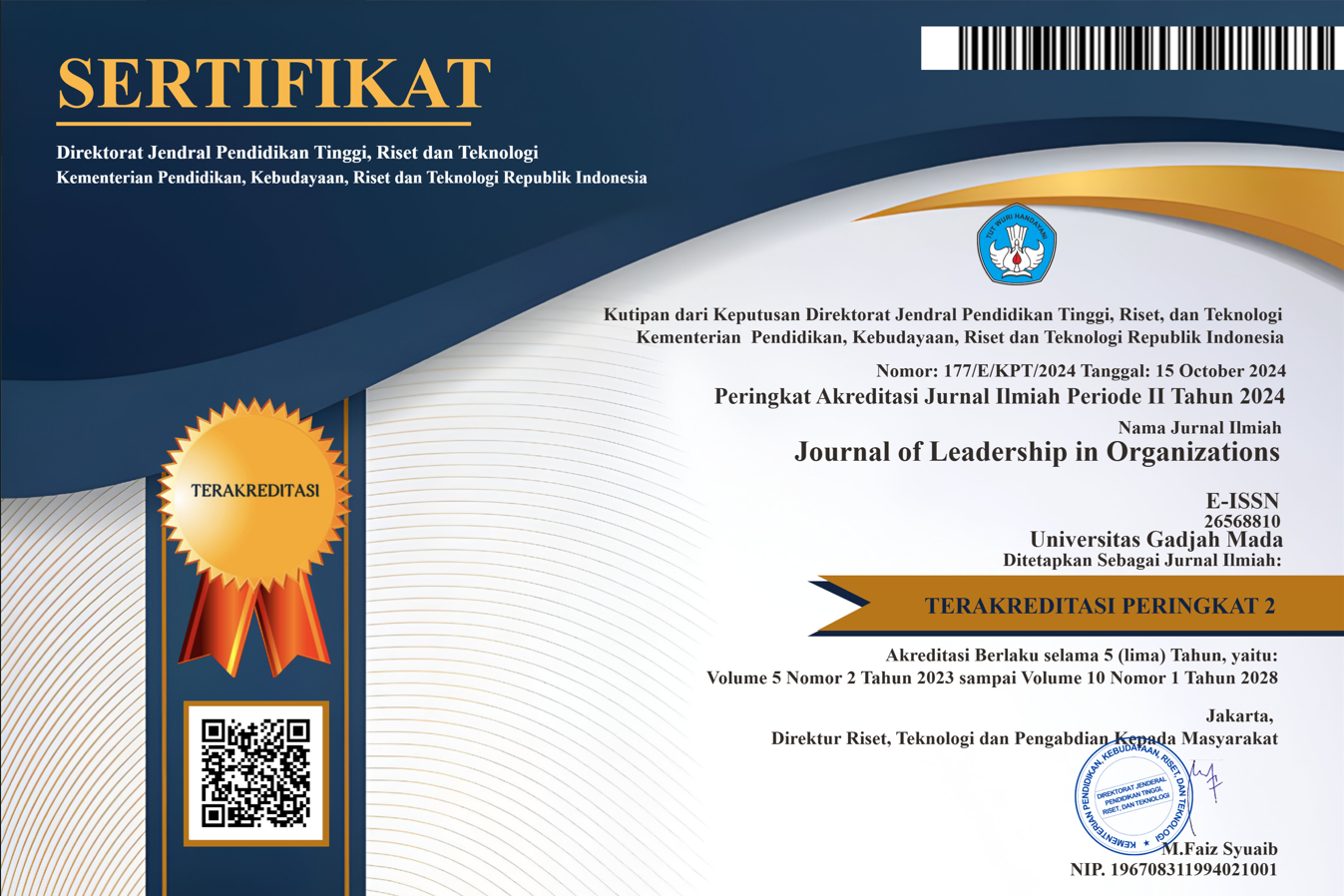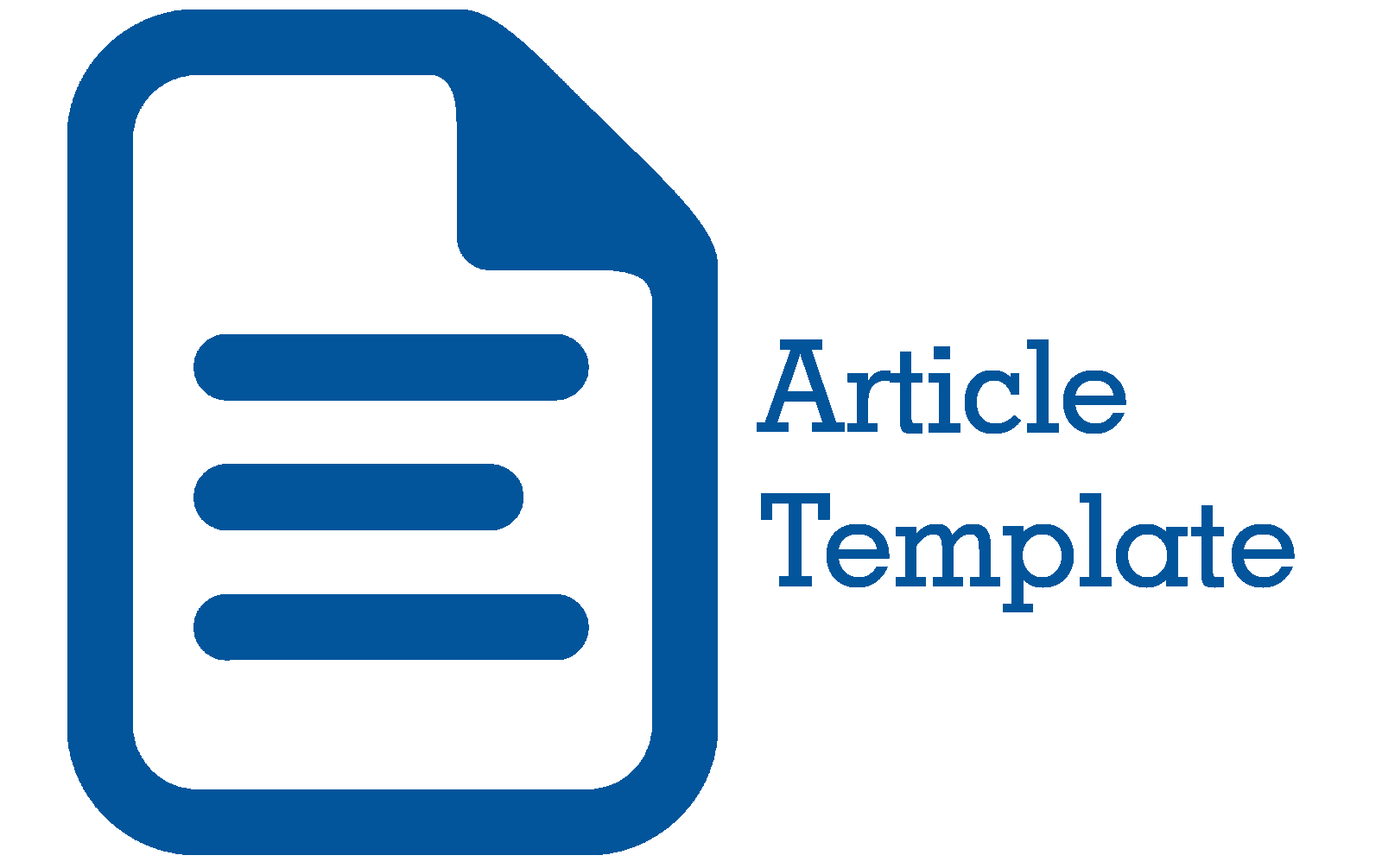Model Leadership Style Governor Kepulauan Riau Province During Covid-19 Pandemic in Indonesia
Fitri Kurnianingsih(1*), Lamidi Lamidi(2), Oksep Adhayanto(3), Mahadiansar Mahadiansar(4), Rio Yusri Maulana(5)
(1) Universitas Maritim Raja Ali Haji
(2) Universitas Maritim Raja Ali Haji
(3) Universitas Maritim Raja Ali Haji
(4) Universitas Maritim Raja Ali Haji
(5) University of Ljubljana
(*) Corresponding Author
Abstract
Introduction/Main Objectives: Model The leadership style of regional heads during the COVID-19 pandemic requires a compelling lead character because to deal with the problems felt by each region, and it must be different so that public responses and criticisms must be carried out quickly and accurately has a priority scale for work effectiveness. Novelty: This study analyzes the leadership style of the regional head in Indonesia, namely the Governor, by taking a case study in the Riau Islands Province (Kepri) during the COVID pandemics. Research Method: The research method used is qualitative with relevant secondary data. Finding/Results: The results of data analysis with software NVivo 12, so that obtained are easy to explain descriptively by analyzing the theory and concept triangulation approach. Conclusion: The results show that the determination of Secondary Data Coding is more on the leadership of Ansar Ahmad in the COVID-19 pandemic as Governor Kepri. In addition, researchers also found that Ansar Ahmad’s leadership style as Governor Kepri greatly influenced the characteristics of leadership style and influential leadership style, which tested with the Jaccard Cluster approach on the strong relationship between communication, awareness, and integrity in carrying out the vision and mission as regional head during a COVID-19 in Kepri Province.
Keywords
Full Text:
PDFReferences
Ahmed, F., Zhao, F., & Faraz, N. A. (2020). How and When Does Inclusive Leadership Curb Psychological Distress During a Crisis? Evidence From the COVID-19 Outbreak. Frontiers in Psychology, 11(1), 1898. https://doi.org/10.3389/FPSYG.2020.01898/BIBTEX
Ali, I. (2020). COVID-19: Are We Ready for the Second Wave? Disaster Medicine and Public Health Preparedness, 14(5), 16–18. https://doi.org/10.1017/DMP.2020.149
Andri, A., & Rico, R. (2021). Gubernur Kepri keluarkan Surat Edaran larangan terima Honorer. Inilah Kepri. https://inilahkepri.id/berita/7235/gubernur-kepri-keluarkan-surat-edaran-larangan-terima-honorer
Antonakis, J. (2021). Leadership to defeat COVID-19. Knowledge Management Research & Practice, 24(2), 210–215. https://doi.org/10.1177/1368430220981418
Ariyanto, B. (2020). Pengelolaan hubungan pusat dan daerah dalam penanganan pandemi Covid-19. Suloh:J Urnal Fakultas Hukum Universitas Malikussaleh, 8(2), 37–57. https://doi.org/10.29103/SJP.V8I2.3066
Aziz, N. L. L., Zuhro, R. S., Maulana, Y., & Rahmiati, D. (2021). Pola relasi pusat dan daerah era pandemi Covid-19. Jurnal Penelitian Politik, 18(1), 77–94. https://doi.org/10.14203/JPP.V18I1.967
Barreiro-Gen, M., Lozano, R., & Zafar, A. (2020). Changes in Sustainability Priorities in Organisations due to the COVID-19 Outbreak: Averting Environmental Rebound Effects on Society. Sustainability, 12(12), 5031. https://doi.org/10.3390/SU12125031
Bass, B. M., & Riggio, R. E. (2012). Transformational Leadership. Psychology Press.
Bazeley, P. (2007). Qualitative data analysis with NVivo. SAGE Publications.
Blake, R. R., & Mouton, J. S. (1982). How to choose a leadership style. Training & Development Journal, 36(2), 38–47. https://psycnet.apa.org/record/1982-13225-001
Bush, T. (2011). Succession planning in England: new leaders and new forms of leadership. Formerly School Organisation, 31(3), 181–198. https://doi.org/10.1080/13632434.2010.545383
Ciulla, J. B. (2003). The ethics of leadership. Wadsworth/Thomson Learning.
Clark, K., & Clark, M. (1990). Measures of leadership. Leadership Library of America. https://psycnet.apa.org/record/1991-97354-000
Conger, J. A., & Kanungo, R. N. (1998). Charismatic Leadership in Organizations. SAGE Publications.
Crayne, M. P., & Medeiros, K. E. (2021). Making sense of crisis: Charismatic, ideological, and pragmatic leadership in response to COVID-19. American Psychologist, 76(3), 462–474. https://doi.org/10.1037/AMP0000715
Cremer, D. de. (2006). Affective and motivational consequences of leader self-sacrifice: The moderating effect of autocratic leadership. The Leadership Quarterly, 17(1), 79–93. https://doi.org/10.1016/J.LEAQUA.2005.10.005
Davies, B., & Davies, B. (2007). Strategic leadership. School Leadership & Management, 24(1), 29–38. https://doi.org/10.1080/1363243042000172804
Edhlund, B. M., & McDougall, A. G. (2019). NVivo 12 essentials. Lulu.com.
Eisenhowen, D. D. (1965). What is Leadership? The Readers, 49–54.
Elliott, A., & Lemert, C. (2009). The New Individualism: The Emotional Costs of Globalization. The New Individualism: The Emotional Costs of Globalization: Second Edition (2nd ed.). Routledge. https://doi.org/10.4324/9780203865705
Endres, G. M., & Smoak, L. M. (2008). The human resource craze: Human performance improvement and employee engagement. Organization Development Journal, 26(2), 69–78.
Fadhlurrohman, M. I., Syarifuddin, T. I., & Khairina, E. (2021). Political ethics in leadership: Impact of behavior ethics implementation of regional heads in Indonesia. Journal of Government and Political Issues, 1(1), 45–55–45–55. https://doi.org/10.53341/JGPI.V1I1.10
Fadil, I. (2021). Simpang Siur Masalah Labuh Jangkar, Gubernur Kepri Surati Menhub. Kepripedia.Com. https://kumparan.com/kepripedia/simpang-siur-masalah-labuh-jangkar-gubernur-kepri-surati-menhub-1wZciwAI45n
Fernandez, A. A., & Shaw, G. P. (2020). Academic Leadership in a Time of Crisis: The Coronavirus and COVID-19. Journal of Leadership Studies, 14(1), 39–45. https://doi.org/10.1002/JLS.21684
Fridayani, H. D., & Soong, J. J. (2021). The Emergent Role of Local Government On Covid-19 Outbreak In Indonesia: A New State-Society Perspective. Journal of Governance, 6(1), 22–45. https://doi.org/10.31506/JOG.V6I1.10287
Fullan, M. (1996). Leadership for Change. International Handbook of Educational Leadership and Administration, 701–722. https://doi.org/10.1007/978-94-009-1573-2_21
Galvan, J. L., & Galvan, M. C. (2017). Writing literature reviews : A guide for the student of the social and behavioral sciences (7th ed.). Routledge.
Gibson, C. (2012). New times demand new scholarship: Research universities and civic engagement: A leadership agenda. Journal of Higher Education Outreach and Engagement, 16(4), 235–270.
Goleman, D. (2017). Leadership that gets results (Harvard Business Review Classics). Harvard Business Review Press.
Goleman, D., Boyatzis, R., & McKee, A. (2013). Primal leadership: Unleashing the power of emotional intelligence. Harvard Business Press.
Greer, W. W. (1973). Leadership Style and Leader Characteristics in Bureaucratic Organizations. George Washington University.
Head, B., Brown, A. J., & Connors, C. (2017). Consequences, Capacity, and Coherence: An Overall Approach to Integrity System Assessment. Routledge. https://doi.org/10.4324/9781315245867-24
Hermann, C., & Steinmetz, D. (2020). Covid-19, super-diversity, crisis-communication, and leadership: lessons to be learned. International Journal of Economics, Business and Management Research, 4(06), 311–329. https://www.bbc.com/news/world-us-canada-52245690
Hersey, P., & Blanchard, K. H. (1982). Leadership style: Attitudes and behaviors. Training & Development Journal, 50–52. https://psycnet.apa.org/record/1982-24563-001
Heryanto, F. (2021). Gubernur Kepri Minta Renja OPD Tahun 2022 Harus Tepat Sasaran - Haluan Kepri. Haluan Kepri. https://kepri.harianhaluan.com/daerah/pr-13597105/gubernur-kepri-minta-renja-opd-tahun-2022-harus-tepat-sasaran?page=all
Hidiroglu, D. (2020). Strategic Leadership: Best Practical Leadership Style to Business Strategies in the Period of Covid-19 Epidemic. Turkish Studies - Social Sciences, 15(4), 1945–1955. https://doi.org/10.29228/TURKISHSTUDIES.43445
Hirpara, D. H., & Taylor, B. (2020). Leadership proficiency in surgery: lessons from the COVID-19 pandemic. Canadian Journal of Surgery, 63(3), E229. https://doi.org/10.1503/CJS.006020
Huy, Q. N. (1999). Emotional Capability, Emotional Intelligence, and Radical Change. Academy of Management, 24(2), 325–345. https://doi.org/10.5465/AMR.1999.1893939
Inasis, G. V. (2021). Travel Bubble dengan Singapura Tidak Ditunda, Gubernur: Kepri Siap Terima Wisman. Kumparan Travel. https://kumparan.com/kumparantravel/travel-bubble-dengan-singapura-tidak-ditunda-gubernur-kepri-siap-terima-wisman-1wi99wljp8O/full
Johnston, M. P. (2014). Secondary Data Analysis: A Method of which the Time Has Come. Qualitative and Quantitative Methods in Libraries, 3(3), 619–626. http://www.qqml-journal.net/index.php/qqml/article/view/169
Kapasia, N., Paul, P., Roy, A., Saha, J., Zaveri, A., Mallick, R., Barman, B., Das, P., & Chouhan, P. (2020). Impact of lockdown on learning status of undergraduate and postgraduate students during COVID-19 pandemic in West Bengal, India. Children and Youth Services Review, 116(1), 105194. https://doi.org/10.1016/J.CHILDYOUTH.2020.105194
Lian, X., Huang, J., Zhang, L., Liu, C., Liu, X., & Wang, L. (2020). Environmental indicator for effective control of COVID-19 spreading. MedRxiv, 1–24. https://doi.org/10.1101/2020.05.12.20099804
Lombardi, S., Pina e Cunha, M., & Giustiniano, L. (2021). Improvising resilience: The unfolding of resilient leadership in COVID-19 times. International Journal of Hospitality Management, 95(5), 102904. https://doi.org/10.1016/J.IJHM.2021.102904
Low, P. K. C. (2006). Father leadership: the Singapore case study. Management Decision, 44(1), 89–104. https://doi.org/10.1108/00251740610641481
McAlearney, A. S., Gaughan, A. A., DePuccio, M. J., MacEwan, S. R., Hebert, C., & Walker, D. M. (2021). Leadership practices to promote infection prevention: Lessons from a qualitative study. American Journal of Infection Control, 49(5), 536–541. https://doi.org/10.1016/J.AJIC.2020.09.001
Miles, M., Huberman, M., & Saldana, J. (2014). Qualitative data analysis. SAGE Publications.
Milliken, A., Jurchak, M., Sadovnikoff, N., Feldman, W. B., Shah, S. B., Galluzzo, M., Krempin, J., & Goralnick, E. (2020). Addressing challenges associated with operationalizing crisis standards of care protocol for the Covid-19 Pandemic. Innovation in Care Delivery, 1–4. https://doi.org/10.1056/CAT.20.0384
Nicola, M., Sohrabi, C., Mathew, G., Kerwan, A., Al-Jabir, A., Griffin, M., Agha, M., & Agha, R. (2020). Health policy and leadership models during the COVID-19 pandemic: A review. International Journal of Surgery, 81(1), 122–129. https://doi.org/10.1016/J.IJSU.2020.07.026
Olsen, W. (2004). Methodological triangulation and realist research. In Making realism work: realist social theory and empirical research (p. 197). Routledge.
Plessis, D. du, & Keyter, C. (2020). Suitable leadership style for the Covid-19 converged crisis. AfrJournal of Public Sector Development and Governance, 3(1), 61–73. https://doi.org/10.10520/EJC-AJPSDG-V3-N1-A3
Posner, B. Z., & Kouzes, J. M. (1996). Ten Lessons for Leaders and Leadership Developers: Journal of Leadership & Organizational Studies, 3(3), 3–10. https://doi.org/10.1177/107179199700300302
Pramono, C. A., Manurung, A. H., Heriyati, P., & Kosasih, W. (2021). Factors affecting start-up behavior and start-up performance during the Covid-19 pandemic in Indonesia. The Journal of Asian Finance, Economics, and Business, 8(4), 809–817. https://doi.org/10.13106/JAFEB.2021.VOL8.NO4.0809
Pratiwi, D. K. (2021). Inovasi kebijakan pemerintah daerah dalam penanganan Covid-19 di Indonesia. Amnesti: Jurnal Hukum, 3(1), 37–52. https://doi.org/10.37729/AMNESTI.V3I1.929
Rahman, A., & Sjoraida, D. F. (2017). Strategi komunikasi pemerintah Kabupaten Subang menyosialisasikan gerakan pembangunan untuk rakyat infrastruktur berkelanjutan. Jurnal Kajian Komunikasi, 5(2), 136–146. https://doi.org/10.24198/JKK.V5I2.8443
Reddin, W. J. (1977). An Integration of Leader-Behavior Typologies. Group & Organization Studies, 2(3), 282–295. https://doi.org/10.1177/105960117700200303
Ryan, J. (2021). Relasi pusat dan daerah dalam implementasi kebijakan penanganan Covid-19: studi tentang tarik menarik kepentingan di Provinsi DKI Jakarta. https://repository.unair.ac.id/108927/
Samin, R. (2021). Central-local government dalam manajemen bencana pandemi COVID-19 di Indonesia. Ganaya : Jurnal Ilmu Sosial Dan Humaniora, 4(2), 709–721. https://doi.org/10.37329/GANAYA.V4I2.1419
Saraswati, P. S. (2020). Kebijakan hukum terhadap penanganan pandemi Covid-19 di Indonesia. Kertha Wicaksoana, 14(2), 147–152. https://doi.org/10.22225/KW.14.2.1923.147-152
Sarjana, I. M. B. (2018). Questioning the Decentralization System in Managing Public Sector Integrity in Indonesia. Advances in Social Science, Education and Humanities Research, 80–86. https://www.atlantis-press.com/proceedings/eropa-18/125923345
Setiawan, R., & Mahadiansar, M. (2020). Forecasting analysis : The Riau Islands local government role In Covid-19 disaster management. Jurnal Studi Pemerintahan, 11(3). https://doi.org/10.18196/jgp.113121
Setyawan, F. E. B., & Lestari, R. (2020). Challenges of Stay-at-Home Policy Implementation During the Coronavirus (Covid-19) Pandemic in Indonesia. Jurnal Administrasi Kesehatan Indonesia, 8(0), 15–20. https://doi.org/10.20473/JAKI.V8I0.2020.15-20
Shingler-Nace, A. (2020). COVID-19: When Leadership Calls. Nurse Leader, 18(3), 202–203. https://doi.org/10.1016/J.MNL.2020.03.017
Solahudin, D., Amin, D. E. S., Sumpena, D., & Hilman, F. A. (2020). Analisis kepemimpinan di Indonesia dalam kerangka tanggap-darurat Covid-19.
Stoller, J. K. (2020). Reflections on leadership in the time of COVID-19. BMJ Public Health Emergency Collection, 4(2), 77–79. https://doi.org/10.1136/LEADER-2020-000244
Sugiarto, S., Lestari, A., & Fachlevi, M. R. (2021). Actualization of situational leadership in handling Covid-19 and national economic recovery to improve community welfare in the context of realizing a resilient Indonesia. Kontigensi: Jurnal Ilmiah Manajemen, 9(1), 235–249. https://doi.org/10.35673/AJMPI.V3I1.199
Suprapti, S., Asbari, M., Cahyono, Y., & Mufid, A. (2020). Leadership style, organizational culture, and innovative behavior on public Health center performance during pandemic Covid-19. Journal of Industrial Engineering & Management Research, 1(2), 76–88. https://doi.org/10.7777/JIEMAR.V1I2.42
Suyatno, S. (2016). Pemilihan Kepala Daerah (Pilkada) dan Tantangan Demokrasi Lokal di Indonesia. Politik Indonesia: Indonesian Political Science Review, 1(2), 212–230. https://doi.org/10.15294/JPI.V1I2.6586
Syarifuddin, T. I., Budiman, & Purwaningsih, T. (2021). Regional Head Communication Patterns on Social Media in Handling the Covid-19 Pandemic. IOP Conference Series: Earth and Environmental Science, 717(1), 1–8. https://doi.org/10.1088/1755-1315/717/1/012020
Talu, S., & Nazarov, A. (2020). Challenges and Competencies of Leadership in Covid-19 Pandemic. Proceedings of the Research Technologies of Pandemic Coronavirus Impact (RTCOV 2020), 518–524. https://doi.org/10.2991/assehr.k.201105.092
Tobari, T. (2021). Gubernur Ansar Perjuangkan Kepri Kelola Labuh Jangkar. https://infopublik.id/kategori/nusantara/566965/gubernur-ansar-perjuangkan-kepri-kelola-labuh-jangkar
Toquero, C. M. (2020). Challenges and Opportunities for Higher Education Amid the COVID-19 Pandemic: The Philippine Context. Pedagogical Research, 5(4), 2468–4929. https://www.pedagogicalresearch.com
Article Metrics
Refbacks
- There are currently no refbacks.
Copyright (c) 2023 Journal of Leadership in Organizations

This work is licensed under a Creative Commons Attribution-ShareAlike 4.0 International License.
| Journal of Leadership in Organizations |
| Journal of Leadership in Organizations (JLO), with registered number ISSN 2656-8829 (Print) and ISSN 2656-8810 (Online), is published by the Center for Leadership Studies, Department of Management, Faculty of Economics and Business, Universitas Gadjah Mada. The content of this website is licensed under a Creative Commons Attribution-ShareAlike 4.0 International License |
| © 2019 Journal of Leadership in Organizations | |





_logo2.png)


.png)




